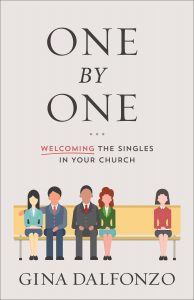We Christians today have a very odd relationship with the idea of control. We pay lip service to the idea that God has it and we don’t. We sing—at least if we go to a church that still incorporates hymns into the service—“I Surrender All” and “Have Thine Own Way, Lord.” We remind each other to “let go and let God.”
And yet, somewhere inside ourselves, we still attempt to hang on to control for dear life.

I really believe that a large part of the reason married churchgoers are often thrown for a loop by the singles is that, deep down, we are completely wedded to the idea that we should be able to control our own lives.
If a fellow Christian who’s single tells you that he or she really wants to be married but hasn’t been able to make it happen, it just might trigger a disbelieving or even a worried response. Because we attach such importance to marriage and family, I think a lot of churchgoers find the idea of a lack of control in these areas particularly disturbing. These are things the church considers so essential that we have to be able to control them; surely we can’t just leave this up to God! (Hence those ever-popular formulae for getting God to bring you your spouse.)
But the fact is whatever control we think we have in these areas is an illusion. An examination of each step in the dating or courtship process makes this quite clear.
- We have no guarantee that someone we might be romantically interested in will come into our lives.
- A woman has no guarantee that a man she likes will ask her out.
- If a man asks a woman out, he has no guarantee that she will say yes. (And vice versa, for those who are okay with the woman asking the man.)
- If they do go out, neither has any guarantee that the other person will want to go out a second or third or fourth time.
And so on, and so forth. When you break it down like that, it’s remarkable how little control we actually have over the process, especially in comparison with how much control we think we have. So much of what happens in this part of our lives depends on the decisions of someone else, and these are decisions we cannot and should not control. As Henry Cloud and John Townsend put it in their indispensable book Boundaries, “We are not . . . responsible for other people. Nowhere are we commanded to have ‘other-control,’ although we spend a lot of time and energy to get it! We are responsible to others and for ourselves.”(1) In other words, we can make decisions about whom we prefer to form a romantic connection with and how we follow through, but we cannot make the other party comply with our wishes.
The fact that we actually make relatively little of this happen to ourselves—that we have so little control over it all—is a pretty terrifying lesson to learn. But it’s also a healthy one. Learning this about ourselves helps uproot some of the deepest misconceptions we have about how dependent we truly are on God, how much He does for us, and how little we can do for ourselves or our loved ones.
This is an area where singles have much to teach their fellow church members. By necessity, we’ve come to understand exactly what we can and can’t control. By our example we can help demonstrate what it looks like to trust God even in those frightening areas of life in which we have little or no say.
1Dr. Henry Cloud and Dr. John Townsend, Boundaries (Grand Rapids: Zondervan, 1992), 32.
Excerpt from Gina Dalfonzo’s new book One by One: Welcoming the Singles into Your Church released on June 20, 2017, from Baker Books, a division of Baker Publishing Group. Used by permission.